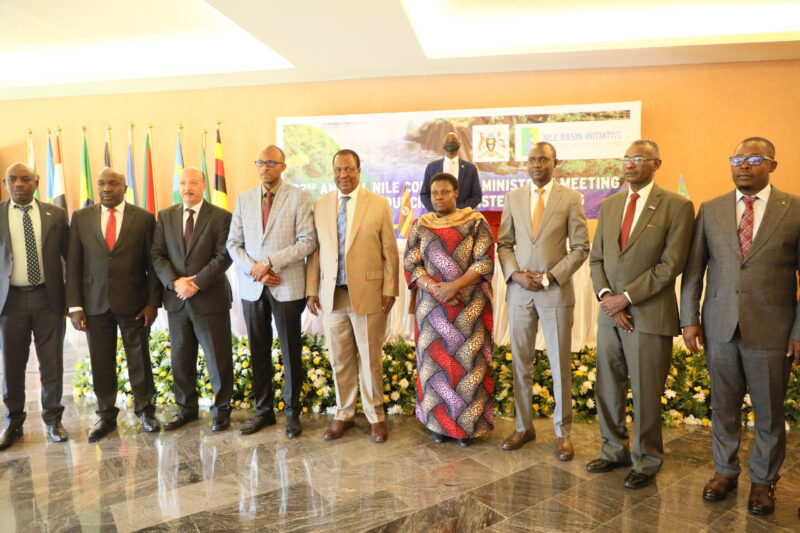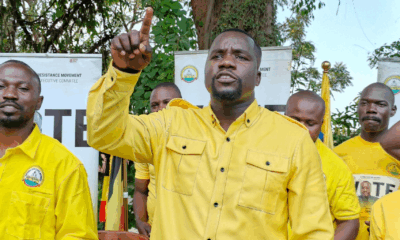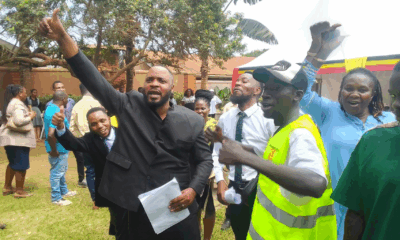News
Signing of CFA brings Nile basin countries to brink of victory, but there are warnings against further delays

Uganda’s Vice president Jessica Alupo (in purple and red Kitenge dress) with water Ministers at the 32nd NileCom Meeting in Munyonyo, Kampala Uganda
Nile Basin Countries are on the brink of realising ultimate victory in the management of the Nile waters following the successful signing of the Cooperative Framework Agreement by at least six of the ten member countries.
It has taken almost 14 years to achieve the breakthrough and there are fears that the forces that worked to cause the delay could still interfere with the formation of the permanent Nile River Basin Commission and thwart the cooperative agenda.
The chairman of the Nile Council of Ministers NileCom – the top decision-making organ of the Nile Basin Initiative (NBI) who is also Uganda’s Minister of Water Hon. Sam Cheptoris, revealed that Burundi and South Sudan have signed the agreement. South Sudan is yet to deposit the agreement with the African Union in Addis Ababa, Ethiopia.
Kenya’s Parliament endorsed the CFA more than a year ago but the president is yet to approve it to allow it be deposited with the AU.
Mr. Cheptoris said: “I wish therefore to congratulate the Republic of Burundi and the Republic of South Sudan for ratifying and acceding to the CFA respectively. The actions of the two countries have enabled us to realize six basin states that have ratified or acceded to the CFA. With this latest development, we are well set to move forward with the establishment of the Nile Basin Commission.”
But the Minister warned that even with this achievement, members are now facing an uphill task of finally establishing the long-awaited permanent and legal Nile River Basin Commission.
Like many other bodies of its kind in the world, the Nile River Basin Commission, will coordinate, govern and harmonise investments on the longest river in the world as well as its vast catchment.
The NileCom chair didn’t hide his frustration with Egypt’s persistent efforts to sabotage and derail the attainment of the ultimate goal of establishing the Commission.
Cheptoris informed the meeting that was officiated by Uganda’s Vice President Jessica Alupo, that as NileCom chair, he has had to undertake diplomatic missions in Germany, Brussels – European Union headquarters, and the World Bank – to reassure key donors of the community, to try to clear its name that was muddied by Egypt.
The call to arms by the NileCom chair for member countries to redouble efforts in the face of Egypt’s opposition is a serious matter considering the growing sense of disillusionment among previously supportive member counties over the slow progress towards the Commission.
As Mr. Innocent Ntabana, a former Executive Director of NBI, told this writer, that while achieving the ratification of the CFA is commendable, it has taken too long to arrive at the current stage that further delays might make the water scarcity challenges more acute as countries adopt unilateral decisions.
“We are very near (to realising) the Commission. But our wish is that the process should be speeded up, because really it has taken too long. If we delay, the water scarcity issue may worsen as countries undertake unilateral investment decisions.”
Ensuring that Nile basin member countries achieve cooperation sooner rather than later is of critical importance. In fact the Minister of Water of the Republic of South Sudan, Hon. Pal Mai Deng, described it as an existential matter for his country.
In his speech at the recent NileCom meeting, Mr. Deng pleaded with member countries to urgently come together to address the impacts of climate change.
He said: “The region is experiencing the worst form of climate crises with Kenya, Burundi, Ethiopia and South Sudan hugely affected by torrential rains, landslides and devastating flooding which call for joint frontline action to combat and mitigate the risks.”
He added: “Destruction of infrastructure, assets and livelihood has reached maximum destructive level, with one of the states Unity State, nearly turned into a lake.”
Mr. Deng further noted that: “This climate existential threat requires cooperation and collaboration among the Nile Basin countries for us to be able to adapt and mitigate the risks.”
The ravages of climate change, coupled with economic growth, and rising population in the Nile Basin, are some of the factors that were cited by a panel of experts that predicted in a scientific report titled Strategic Water Analysis Report, that the Nile Basin region will face a water scarcity challenge by 2050, if member countries unilaterally implement their current investment plans.
The Strategic Water Analysis Report that was produced by NBI, warned that if each of the ten member countries of the basin executes its own planned investments especially into irrigation, the region will not have adequate water by 2050
It thus called called for a cooperative approach for member countries to avert the crises associated with water scarcity.
Egypt remains utterly opposed to the Cooperative agenda, and insists that Nile Basin countries respect colonial era agreements that granted it and The Sudan, exclusive rights over the waters of the Nile.
During the just concluded NileCom held at Munyonyo in Kampala, Egypt opposed a proposal for Uganda to host the Second Nile Basin Heads of State summit, which could prove vital in the formation of the Permanent Nile River Basin Commission.
Comments

























